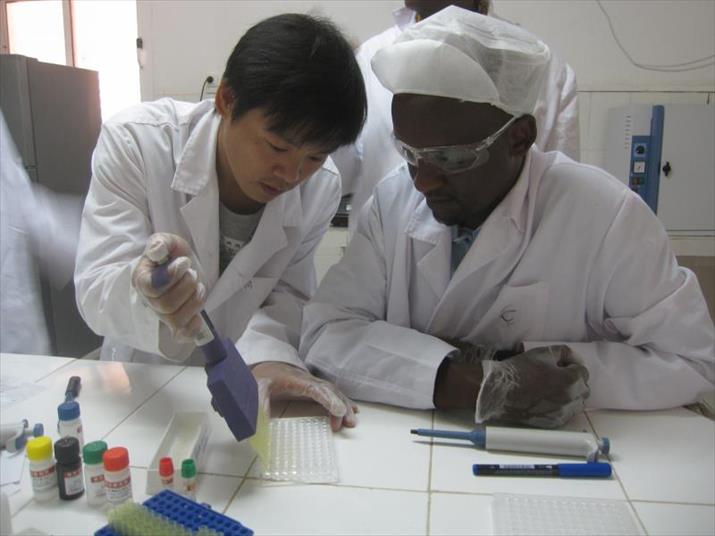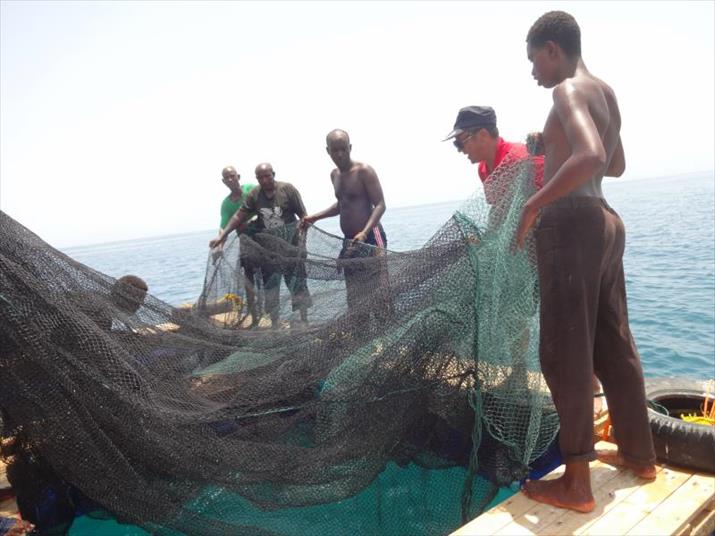|
||||||||||
| Home Nation World Business Opinion Lifestyle ChinAfrica Multimedia Columnists Documents Special Reports |
|
||||||||||
| Home Nation World Business Opinion Lifestyle ChinAfrica Multimedia Columnists Documents Special Reports |
| Africa |
| Knowledge Transfer |
| Chinese experts teach Djiboutian vets and fishermen how to enhance their skills |
| By Liu Jian | VOL. 8 August 2016 ·2016-08-23 |


When Xiao Renrong's phone rang in the middle of the day, he found the caller beside himself. "Please come immediately," the farmer begged. "It's an emergency."
So the 49-year-old Chinese veterinary expert drove 50 km from downtown Djibouti, hoping to be able to save a life.
He found his patient - a cow suffering from malnutrition and dehydration - gasping. Xiao reached out for his medicine bag, dissolving drugs in water. Then he injected the animal with the solution and within 10 minutes, the cow began to urinate.
It was a good sign, the vet told the anxious owner. It indicated the dehydration had been addressed and the cow would soon recover.
This is just one of the many adventures Xiao has faced in the course of his work in Djibouti, the Horn-of-Africa country where he is leading a team of Chinese agricultural experts.
Besides Xiao, who is from the Nanchuan District Center for Animal Disease Prevention and Control in Chongqing, a municipality in southwest China, the team consists of three others: Zhang Pu, another veterinary expert, Li Shuhan, an aquaculture expert, and the team's French interpreter Li Xiaoming.
Forearmed with French
But Xiao doesn't need any interpretation. In 2008, he spent six months and over 10,000 yuan ($1,497) on French lessons. At 41, he was the oldest student in the class. What motivated him to learn a foreign language was the knowledge that he was going to be posted in Djibouti the following year as part of the ongoing agricultural cooperation between China and Djibouti. Learning French, the official language of Djibouti, would help him perform well.
In 2009, armed with his basic French, Xiao went to Djibouti for the first time. Now he is on his third deputation there, which will last for two years.
Since Djibouti's tropical desert climate makes farming difficult, animal husbandry and fishery are the two pillar industries. So the Chinese team is focusing on them.
During his first stint in 2009-10, Xiao and his co-workers discovered that the development of Djibouti's animal husbandry and fishery industries was being hampered by insufficient investment in technology, human resources and infrastructure. So during their second stint from 2012-13, the experts put more effort into demonstrating advanced Chinese agricultural technologies and providing on-site training to vets and farmers.
In the third phase, the Chinese team has brought along new laboratory equipment, veterinary medicines and chemicals worth $70,000 funded by the Chinese Government.
"The aim is to improve local vets' diagnosis and disease prevention ability to better develop the animal husbandry industry in Djibouti," Xiao said.
Earning respect
Xiao and his team's work is well known among Djibouti's ranchers. "They come to test our cattle for diseases. They give a lot of medicines and are always there to help. This is exactly what we need. And we say, thank you, China," said Taher Issa, a rancher who has benefited from the interactions.
During the Muslim holy month of Ramadan, two Chinese veterinary experts and the interpreter continued working in the heat of summer when the average temperature was above 40 degrees Celsius. They went to the pastures and herders' homes to treat the livestock and provided boxes of free medicine to protect the animals from parasites.
"When we help them diagnose diseases and their cattle recover, I can feel their respect and gratitude," Xiao said.
"I am very happy that China and Djibouti have an agreement on agricultural cooperation. The Chinese experts have made outstanding contributions," said Moussa Ibrahim Cheik, Director General of the Department of Animal Husbandry, Djibouti's Ministry of Agriculture, Water Resources, Fisheries, Animal Husbandry and Marine Resources (MAEPE-RH).
Builfing capacity
Since sheep and cattle in Djibouti face a serious threat from parasites, the Chinese experts are training local vets to diagnose and prevent parasitic infections and providing free drugs to herders. In May, Xiao and his colleague Zhang Pu held a two-day workshop where they trained over 40 vets from five regions across the country, demonstrating how to identify, treat and prevent internal and external parasites in sheep and cattle, and how to diagnose and treat major infectious animal diseases.
"The workshop enabled our veterinary staff to learn advanced laboratory techniques to diagnose major animal diseases," Cheik said. "The new knowledge will help them better serve different regions in the future and strengthen our veterinary management system."
Fishing for profits
Li Shuhan has been teaching local fishermen fish farming techniques.
After studying the Djibouti coast, Li proposed a marine cage culture demonstration project at Doraleh, 22 km from the capital city. Marine cages are another way fish can be bred besides in rivers, by inserting netted cages or pens in the sea where the fish spawns are released.
He trained 15 workers to make the cages and in June, four cages, with a total area of 36 square meters, were lowered into the sea. Once the feedstuff is ready, the fish fry will be released into the cages.
"Cages of this size are cost-effective, easy to make and can withstand strong winds and big waves," he explained.
Mohamed Ahmed Awaleh, Djibouti's Minister of MAEPE-RH, spoke highly of the marine cage culture facilities and the Chinese expert's hard work during his visit on June 22.
The pilot cage project will be used for experiments with Li helping to select the right fish species with high economic value and suitable to rear in Djibouti.
"We hope the Chinese Government can give us more technical assistance from 2018 to 2021 under the framework of China-Djibouti cooperation," the minister wrote to the Chinese Embassy in Djibouti. He said he hopes that China continues sending veterinary and aquaculture experts to Djibouti.
|
||
| About Us | Contact Us | Advertise with Us | Subscribe |
| Copyright Beijing Review All rights reserved 京ICP备08005356号-5 京公网安备110102005860号 |